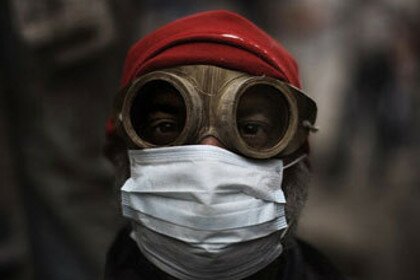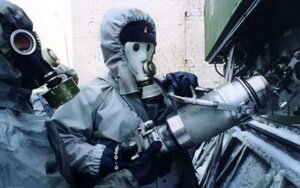
The Independent Analytical Center for Geopolitical Studies “Borysfen Intel” affords ground to the analysts generation for expressing their point of view regarding the political, economic, security, information situation in Ukraine and in the world in general, according to their personal geopolitical studies and analyses.
Note that an authors’ point of view
|
Components of the Firmness of the Syrian State. Part 2.
Components of the Firmness of the Syrian State. Part 1.
Who Has Used Chemical Weapons?
Oleksiy O. Volovych
Today, Barack Obama justifies the need to strike at Syria by the fact that on August 21 through use of chemical weapons in the Damascus suburb of Al-Ghuta, half thousand Syrians were killed, several hundred children included. True, it's terrible, but still it has to be found out — who stands behind the crime. Before that 100,000 Syrians had been killed and many of these victims were a direct result of external intervention on the side of the opposition. If not for the intervention, the Armed Forces of Syria would have kicked foreign mercenaries out of the country long ago, and negotiations on a compromise and civilized settlement of the internal conflict in the country would have been held with a moderate and constructive opposition, — which President B. Assad has repeatedly offered.
 |
| On August 21 through use of chemical weapons in the Damascus suburb of Al-Ghuta, half thousand Syrians were killed, several hundred children included http://365news.biz |
At present, there is considerable evidence that it was opposition fighters who used chemical weapons, trying to make it look like the action on the part of the government troops with the sole purpose — to encourage the West to start a large-scale military intervention in the Syrian conflict on the side of the opposition. On the 12th of September Russian President Vladimir Putin appealed directly to the American people and American politicians, stating in the New York Times Russia's position on the situation around Syria. About the use of chemical weapons in Syria, President Vladimir Putin said, “... there is every reason to believe that it was not done by the Syrian Army, but by the opposition forces. The aim was to provoke the intervention of powerful patrons from abroad, which in this case would act on the side of the fundamentalists.” Putin called on Americans to “stop using the language of force and return to the path of civilized political- diplomatic resolution of conflicts.”
September 12 in an interview to “Russia 24” TV channel, Syrian President B. Assad reassured that he had not given the order to use chemical weapons. B. Assad said that in the nearest days he would send an official request to the UN on Syria's signing of the Convention on the prohibition of chemical weapons. Besides, B. Assad said that the Middle East in general should be free from weapons of mass destruction, reminding that “it was the United States who let this to allow Israel to possess nuclear, chemical and biological weapons”. According to B. Assad, as “the West and the countries of the region, such as Turkey and Saudi Arabia and earlier Qatar have direct contacts with terrorists and support them with all kinds of weapons, we believe that one of these countries had been supplying chemical weapons to terrorists”.
Evidence of opposition fighters' using chemical weapons also come from independent sources. Thus, freed from Islamist extremists' captivity in Syria, a Belgian teacher Pierre da Pratt, said on the 9th of September that the chemical weapons were used in the suburb of Damascus not by the Syrian government troops but by opposition fighters. Pierre da Pratt made this conclusion on the basis of an overheard by him conversation between militants.
After the video of mass killing of children in the suburbs of Damascus, al- Ghuta, had been placed on the Internet, a French Internet site Voltairenet.org from the analysis of the video came to the conclusion that in reality those were the children abducted by jihadists in Alevy villages around Latakіa, 200 kilometers from Ghuta, and two weeks before the event. All victims of the massacre in al-Ghuta belong to families that support the Syrian government. And those who boil over “B. Assad's crimes,” are, in fact, killers of the children.
One step forward - two steps back?
Speaking on the 9th of September at a joint press conference with British Foreign Secretary William Hague in London, U.S. Secretary of State, John Kerry said that Syrian President B. Assad “can avoid a foreign military intervention, if over the next week he has given all chemical weapons to the International Community.” At this, Kerry pointed out that “a military operation cannot be a solution to the problem. We have no illusions about this. But of conditions are needed for a peaceful settlement”. On the same day, Russian Foreign Minister Sergei Lavrov voiced Moscow's initiative, calling on the Syrian authorities to put under international control chemical weapons and to destroy it in the future, as well as to join the Convention on the prohibition of chemical weapons. Syrian Foreign Minister Walid Muallem, who was on this day in Moscow, on behalf of his government, supported the initiative of Russia, noting the “wisdom of the Russian leadership, which is trying to prevent the American aggression against our people”.
President Putin has voiced his view on the situation in Syria. He published an open letter in the New York Times
President Barack Obama said in his statement on September 9, that he considered the Russian proposal for international control of chemical weapons in Syria a potentially “breakthrough” one. Obama also said that “if Bashar Assad gives up chemical weapons, the attack on Syria will be put on indefinitely long pause”. U.S. Secretary of Defense Chuck Hagel also said that the Russian initiative “can be a real resolution of the crisis.” Most of the leaders of great powers, as well as the UN, European Parliament, European Union and the Arab League supported the Russian initiative. However, as expected, the Syrian opposition threw Russia's initiative on establishing international control over chemical weapons in Syria, and once again demanded from Western countries an “adequate response” to the actions of “Assad's regime.”
Turkish Prime Minister R. Erdogan, known as a fierce opponent of the current Syrian government and a supporter of Western military intervention in the civil war in Syria, said he had serious doubts that B. Assad would fulfill his promise to transfer chemical weapons arsenals under international control. R. Erdogan believes that this will give B. Assad a chance to win a time “for a new massacre”. R. Erdogan said that the consent of the United States to consider the Russian settlement plan is nothing more than a concession to Russia and manifestation of indecision.

|
|
Syria's friends and enemies http://war-in-syria.livejournal.com/ |
Be that as it may, Russian initiative tipped the scales in favor of a political settlement of the Syrian crisis. The first step in this direction was the meeting on September 12-13 in Geneva, of Russian Foreign Minister Sergei Lavrov with U.S. Secretary of State John Kerry, the main aim of which was to discuss the mechanism of transfer of Syrian chemical arsenal under international control, as well as discussing the format of the international conference “Geneva-2”, for which now new possibilities have opened.
In our view, Barack Obama's decision to refrain from striking on Syria was an eye opener for the whole world, but not for the Kremlin and the White House. The fact that John Kerry and S. Lavrov almost simultaneously voiced a proposal to take Syrian stockpiles of chemical weapons under international supervision shows that Moscow and Washington have long been negotiating on this issue. According to some reports, Washington and Moscow have been discussing the issue of Syrian chemical weapons for over a year. The idea to establish control over Syria's chemical arsenal dates back to the G-20 Summit in Los Cabos, Mexico in June 2012. Finally, the plan took shape in the G-20 Summit in St. Petersburg during the 30-minute conversation of Vladimir Putin and Barack Obama in front of the surprised heads of other states of the “Twenty.”
The Russian initiative has strengthened the critical attitude of the majority of U.S. congressmen to B. Obama's intentions to draw the United States into a civil war in Syria. Republican House Speaker John Boehner and the Republican majority's leader, Mitch McConnell unequivocally condemned B. Obama's plans to strike at Damascus, explaining their position by the fact that majority of the American people are against bombings Syria, so not listening to the voice of the people, would demonstrate inferiority of the American democracy. The U.S. Senate is going to propose to President Barack Obama to postpone for 45 days the strike at Syria in order to give a chance to realize the initiative of Moscow. About the decision to await the results of diplomatic efforts before ordering to bomb Syria, Obama told in a televised address to the nation on September 11.
Not politicians and congressmen alone criticize President B. Obama, but so do representatives of large U.S. businesses. Thus, the American billionaire Donald Trump, who has publicly criticized President Barack Obama for his intention to launch a military strike against Syria, has expressed his admiration for Putin's appeal to Americans, calling it a “masterpiece for Russia, and a disaster for the United States.” D. Trump said the following, “Putin is lecturing to our president. Never before did our country look so weak. China, Russia and Iran are laughing at us. We have weak leaders who threaten our national security. Dangerous times are these.”
***
Only at first glance it seems that Syria is far from Ukraine and the dramatic situation in that country only partially hurts national interests of our country. In this situation, I am most worried about the fact that when the majority of Ukrainian citizens do not approve of Washington's position on the decision of crises in the world, it threatens with spreading in Ukraine of anti-American and anti-Western sentiment at the domestic level, which creates a favorable environment for the activities of political forces that want to see Ukraine in Eurasia and the Customs Union. Equally dangerous is the injection of anti-Russian feelings in everyday life. In difficult situations that sometimes arise in international relations; we must distinguish between the actions and attitudes of ruling elites and national interests of the Ukrainian, American and Russian people. Ruling elites keep changing, but the people and their interests remain. I am convinced that fundamental interest of the peoples of the United States, Russia and Ukraine is the desire to live in peace and harmony.
In my opinion, to be “pro-Western”,— that is to support the European integration of Ukraine, — does not mean a priori to approve of all that the West does, and to throw away everything that makes Russia. Especially as we have a lot of examples when the USA and Russia, in spite of certain elements of the opposition, can still negotiate when it suits them — and not always in favor of our interest. I think that the “pro-Western” Ukrainians to whom I also belong, should start getting rid of naive illusions and to react to all that “imperfections” that there is in Western civilization, the way they react to faults of the Eurasian civilization. Yes, in our political life and in the process of development of the Ukrainian state there are quite a few annoying flaws and miscalculations. But our European and American partners, as we have seen, are not saints either. We respect European values, but over thousands of years of history of Ukraine-Rus we have also created our own values, which are the basis of our perception of the world and of our identity. When we have a clear position, our own vision of the world (including the assessment of sometimes illegal activities of the USA and NATO in certain regions of the world) the world will respect us better. If we illegibly applaud to anything the West does, Ukrainians will continue to be seen as a backward land, or at best as junior partners, and will be taught — how we should live and what we should do.
Some might say that national interests sometimes require sacrificing moral principles for implementation of pragmatic aspirations and goals. But the strength of any nation or state is in those moral principles. First of all, we have to rely on ourselves. As we live in a real globalized world and, in spite of certain contradictions with both, the West and Russia, the European integration course of Ukraine should be our constant priority. But at this we should not dissolve in Western culture, but should remain ourselves, cherishing our national values, which may differ in some ways from both, the West and Eurasia. Non-aligned status of our state does not deprive us of the opportunity to cooperate with both, NATO and CSTO. However, nobody will protect us, if we are not strong and united, at least like the Syrian nation rallied around its leader President Bashar Assad.

